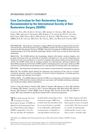 9 citations,
April 2015 in “Dermatologic Therapy”
9 citations,
April 2015 in “Dermatologic Therapy” Hormonal therapies, like flutamide and cyproterone acetate, are safe and effective for treating adult women's acne, especially those with hormone imbalance or resistant acne.
 158 citations,
February 2000 in “Archives of dermatology”
158 citations,
February 2000 in “Archives of dermatology” Some people with pattern hair loss may also have scalp inflammation and scarring similar to lichen planopilaris.
 1 citations,
April 2023 in “Frontiers in Genetics”
1 citations,
April 2023 in “Frontiers in Genetics” The document concludes that individuals with a rare genetic disorder linked to the AEBP1 gene may experience a unique type of hair loss and should be monitored for heart issues.
 8 citations,
December 2022 in “Nature Reviews Endocrinology”
8 citations,
December 2022 in “Nature Reviews Endocrinology” Sex hormones' effects on COVID-19 are unclear and more research is needed to understand their potential as treatment.
July 2022 in “Dermatologica Sinica” Many women with hair loss also have zinc deficiency, iron depletion, or thyroid issues.
 January 2006 in “Dermatologic Surgery”
January 2006 in “Dermatologic Surgery” The Core Curriculum for Hair Restoration Surgery aims to improve doctor training for better, safer, and more natural-looking hair loss treatments.
 2 citations,
February 2021 in “The Journal of clinical and aesthetic dermatology”
2 citations,
February 2021 in “The Journal of clinical and aesthetic dermatology” Understanding the cause of bitemporal hair loss is key to deciding the right treatment.
 14 citations,
June 2021 in “British journal of dermatology/British journal of dermatology, Supplement”
14 citations,
June 2021 in “British journal of dermatology/British journal of dermatology, Supplement” Experts agreed on guidelines to improve research on Frontal Fibrosing Alopecia.
 7 citations,
August 2019 in “Aesthetic Plastic Surgery”
7 citations,
August 2019 in “Aesthetic Plastic Surgery” Both surgical and non-surgical hair loss treatments lack a standard treatment plan and sufficient patient satisfaction data.
 40 citations,
April 1999 in “Drugs”
40 citations,
April 1999 in “Drugs” Finasteride treats enlarged prostate, improves urinary flow, but may cause sexual side effects.
 11 citations,
March 2016 in “Translational Andrology and Urology”
11 citations,
March 2016 in “Translational Andrology and Urology” Nandrolone might increase muscle mass with fewer side effects than testosterone but could cause erectile dysfunction and needs more research.
 1 citations,
September 2017 in “Journal of Investigative Dermatology”
1 citations,
September 2017 in “Journal of Investigative Dermatology” Blocking a specific enzyme can reduce the negative impact of stress hormones on hair growth cells.
December 2022 in “JAMA network open” 5α-Reductase inhibitors may increase depression risk but not dementia or suicide.
 19 citations,
April 2020 in “Dermatologic Therapy”
19 citations,
April 2020 in “Dermatologic Therapy” Dutasteride works better than finasteride for hair loss, with both being safe to use.
 6 citations,
January 2016 in “Annals of Dermatology”
6 citations,
January 2016 in “Annals of Dermatology” Human hair contains more glycosaminoglycans in children than adults, and these compounds decrease with age, possibly affecting hair thickness.
 52 citations,
February 2018 in “Diabetology & Metabolic Syndrome”
52 citations,
February 2018 in “Diabetology & Metabolic Syndrome” Some skin conditions may indicate metabolic syndrome, which could help with early detection and management of related health issues.
 198 citations,
October 2011 in “Journal der Deutschen Dermatologischen Gesellschaft”
198 citations,
October 2011 in “Journal der Deutschen Dermatologischen Gesellschaft” Use minoxidil for hair loss; finasteride and dutasteride for men, dutasteride for women.
 5 citations,
November 2016 in “Experimental and Therapeutic Medicine”
5 citations,
November 2016 in “Experimental and Therapeutic Medicine” BeauTop improves hair growth in androgenetic alopecia patients.
 50 citations,
March 2017 in “PeerJ”
50 citations,
March 2017 in “PeerJ” Using finasteride or dutasteride may cause long-lasting erectile dysfunction.
 21 citations,
July 2017 in “Journal of Cosmetic and Laser Therapy”
21 citations,
July 2017 in “Journal of Cosmetic and Laser Therapy” Vesicular carriers like liposomes may improve cosmetic skin treatment delivery and effectiveness but need more human research.
 11 citations,
November 2012 in “Seminars in Cutaneous Medicine and Surgery”
11 citations,
November 2012 in “Seminars in Cutaneous Medicine and Surgery” Genetic factors affect hair loss, and molecular testing may help predict, diagnose, and treat it.
 1 citations,
January 2017 in “Expert opinion on orphan drugs”
1 citations,
January 2017 in “Expert opinion on orphan drugs” Adalimumab is the most effective treatment for severe hidradenitis suppurativa, but more research is needed to improve treatment options.
 21 citations,
May 2005 in “Journal of the American Veterinary Medical Association”
21 citations,
May 2005 in “Journal of the American Veterinary Medical Association” The exact cause of growth hormone-responsive alopecia in dogs is unclear.
 2 citations,
July 2010 in “Clinical and Experimental Dermatology”
2 citations,
July 2010 in “Clinical and Experimental Dermatology” Delaying hair loss treatment reduces its effectiveness.
 134 citations,
December 2018 in “Dermatology and Therapy”
134 citations,
December 2018 in “Dermatology and Therapy” Some vitamins and minerals like vitamin D and iron can help with certain types of hair loss, but more research is needed for others.
 26 citations,
January 2019 in “Expert Opinion on Investigational Drugs”
26 citations,
January 2019 in “Expert Opinion on Investigational Drugs” New treatments for hair loss show promise, but more research is needed to confirm their safety and effectiveness.
 66 citations,
March 2009 in “British journal of surgery”
66 citations,
March 2009 in “British journal of surgery” Hidradenitis suppurativa treatment should be tailored to the individual, with quitting smoking being important.
 4 citations,
September 2018 in “International journal of research - granthaalayah”
4 citations,
September 2018 in “International journal of research - granthaalayah” Most female students at Qassim University know about PCOS, but there are still misunderstandings about it.
 7 citations,
January 2015 in “Biological & Pharmaceutical Bulletin”
7 citations,
January 2015 in “Biological & Pharmaceutical Bulletin” Rice Bran Supercritical CO2 Extract significantly increased hair density and diameter in male alopecia patients without any side effects.
 19 citations,
May 2020 in “Cells”
19 citations,
May 2020 in “Cells” Substance from human umbilical cord blood cells promotes hair growth.



























